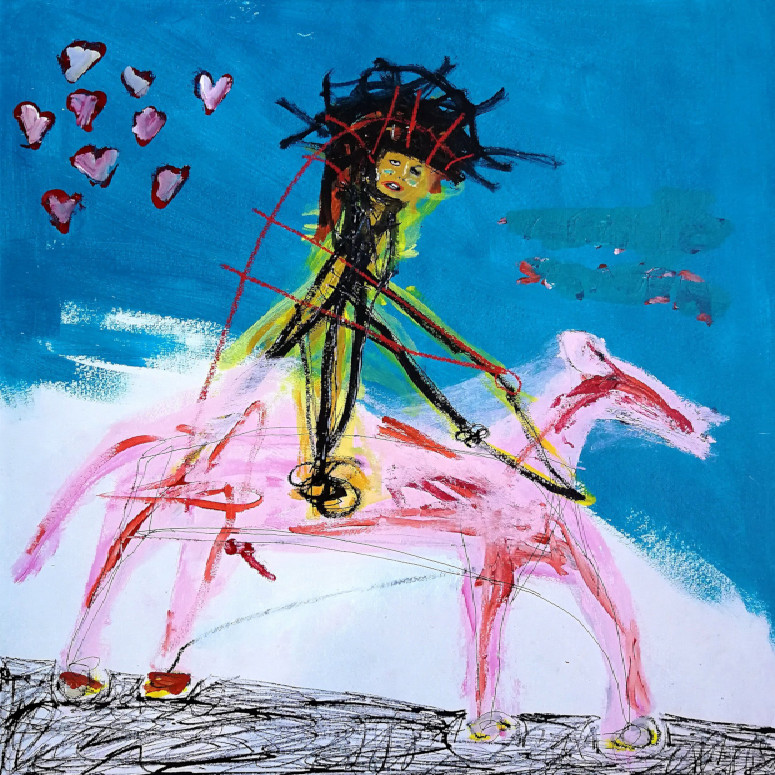melancholy
Can I Escape the Person My Family Made Me?

Artwork by Emanuele Tozzoli via AXS ART
Age 14: This is all a bit cliché, isn’t it? He couldn’t exactly say it aloud. He glanced up at his father’s set jaw and balled fists, his mother’s pink nose and eyes cast determinedly downward beneath a new black veil. It was even raining, as though the graveyard with its heavyset marble blocks and wooden crosses needed the added touch of a dozen black umbrellas to set the mood. He shivered. It wasn’t because he stood next to a recently embalmed body—he’d been standing next to it for about half an hour, so actually he was quite used to it now—but merely due to the wind that accompanied the steady rain.
The funeral hadn’t been much of a shock. Antón learned that apparently one begins to plan the funeral before the soon-to-die actually keels over, for the sake of convenience or something. He supposed it must have been a lot of work for his parents to plan the funeral procession, the grave decor, and the somber reception he knew was mere minutes from beginning, but secretly he thought it was a waste to put so much effort into something no one was meant to enjoy.
And no one had spoken to Aunt Nora in years. The fact that she was sick apparently meant more than all the nasty things that his parents had been saying about her since Antón was eight, so the last few months of her life his parents spent almost exclusively on tending to her “transition.” From life to death, that is. That’s what his Dad had called it when explaining to Antón why Nora was suddenly so important to them. She needed help in her transition.
None of it mattered much to Antón. It wasn’t that he was self-absorbed, but it was disturbing to him to watch all these grownups hold on to each other with shaky hands, their faces buried in tissues and lapels. It bothered him especially to see his parents in this state.
He couldn’t help but resent Nora and the whole scene around him. This thing had been planned. She wanted this. Not the death, but the carefully chosen flower arrangements and the coffin with the glossy wood panelling. She knew the grownups would be falling all over themselves to show how sorry they were that they didn’t like her when she was alive. He felt like he was in a movie and everyone around him was just acting out another generic death scene, except Nora wasn’t even the hero. She was barely a minor character.
Age 15: That, of course, wasn’t true. Antón discovered this in the year following the funeral. His fifteenth birthday marked the day his parents’ divorce was finalized. Poor dead Nora’s sister became a divorcee for all the trouble of caring for her sister. His dad’s birthday gift to Antón, besides a generous check, was another talk about transitions. This one was from the unhappy family to the cordial, functioning one, his dad explained. Antón accepted the check and said nothing. That night, clearing away the remaining birthday cake, he watched his mother’s pink nose and her eyes cast determinedly downward. Balloons were popped, confetti thrown away. The last thing he saw before heading to bed was his mother opening an old wine bottle.
Age 16: They were at the cemetery again, which was annoying because they’d been to the grave on the first anniversary of Nora’s death, but this was the second. He hoped this wasn’t going to be a yearly thing. This was something else he didn’t say out loud. Instead he watched his mother stare at that stupid stone like she hadn’t looked at him in years.
Age 17: It turned out it was going to be a yearly thing. Driving away from the graveyard, he watched his mother’s distant stare from the passenger side. He didn’t comment on her slalom driving. Whatever obstacles she was avoiding, he couldn’t see them. At the house he got out and invited a few friends over to stay the night. Long after his mother’s heavy snoring began, they sat on the floor of the kitchen, passing a bottle around. It tasted like irony.
Age 18: His mother became a voice on the phone. His father, a check in the mail. Sometimes he thought he could hear the voices of those old friends when he drank and smoked and used. Sometimes he heard other voices too, ones he hadn’t in too long.
“Mom,” he asked, his voice still lilting with childish cadence, “Why didn’t you invite Auntie Nora to Christmas this year?”
“Daddy said the later it gets, the more rambunctious she is. Though,” his mother said, “Now that I think about about it, that sounds a little like you!” she twirled him in the air and he shrieked happily.
Age 19: “Can you believe it’s been five years?” his mother said quietly. He was home for winter break and the two of them were taking down the Christmas decorations. “I mean, five years.”
“That’s about as long as the time you spent not talking to her before she died,” he almost said. He knew now that had been less her doing and more his dad’s, so he said nothing as he unplugged another string of lights and began yanking them from the dry tree branches.
Age 20: Like Nora, he was buried in a coffin with glossy paneling under a grave strewn with carefully selected flowers. Like Nora, the guests at his funeral didn’t like to use the word “alcoholic.” After all, she died of liver disease. Slowly, sadly, but in the end, not alone. His liver overwhelmed in a single night, Antón had been alone but for a crowd so deafening that no one could hear each other; they watched him fade under pulsating colors.
His father prepared a speech. Something about Antón struggling with transitions. He’d meant to deliver it in the brutal sunlight of the cemetery. But this time it was his father who noticed his mother’s pink nose and eyes cast determinedly downward beneath a faded black veil. And it was his mother who noticed his father’s set jaw and balled fists. So they said nothing, just nothing, because he was his parents’ son.
__
Francesca von Krauland is a Miami-born Cuban and Austrian writer in her final year of pursuing a degree in English and International Studies at Boston College. She is a lover of cappuccinos, cats, and conversations that go on for hours.
More by this writer:
- Traveling Alone With My Thoughts
- Sides
- Clarity
- Surfaces
- Salad and Sad Outcomes
- Reclaiming My Body After Your Love
- To Be Carefree
Be the first to write a comment.
Your feedback
